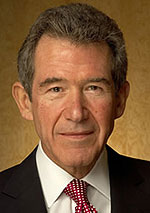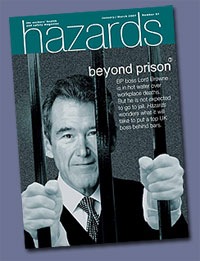Former BP Head To Decimate Environmental And Safety Cultures In UK
 With the announcement on 30th June that Lord Browne of Madingley will become the Government’s lead Non-Executive Director, and his role as the Czar to overhaul how departmental boards are run and improving governance across Whitehall; the coalition government's machinery for the dismantling of regulation and running the country as a business with the aim of putting profit before all else, is now complete.
With the announcement on 30th June that Lord Browne of Madingley will become the Government’s lead Non-Executive Director, and his role as the Czar to overhaul how departmental boards are run and improving governance across Whitehall; the coalition government's machinery for the dismantling of regulation and running the country as a business with the aim of putting profit before all else, is now complete.
According to the government's press release, he will also work closely with the Minister for the Cabinet Office, Francis Maude who was quoted as saying:
“The appointment of Non-Executive Directors will galvanise departmental boards as forums where political and official leadership is brought together to drive up performance. It’s great news for the Government and taxpayer that Lord Browne has accepted this powerful role. His experience will be a real benefit in our drive to make Whitehall work in a more businesslike manner and I am looking forward to working with him to implement our vital reform programme.”
Lord Browne of Madingley said:
“This is a role within Government but also independent of it. Its purpose is to assist in the delivery of policy using relevant experience from business. There is a great need for the best of the business community to be involved during these challenging times for the UK.
But the reality of his appointment is addressed in this month's Hazards "Green Jobs - Safe Jobs" blog. In it, Hazard's Rory O'Neill reminds us that:
"Lord Browne was the architect of the much criticised BP cost- and safety-cutting strategy implicated in the Texas City refinery disaster, which killed 15, and a sequence of other safety and environmental crimes. The scope of the peer’s shake-up of government will include all ministries, including those responsible for workplace and environmental safety and the energy industry."
Rory further explains:
"The Conservative Party, which leads the UK’s coalition government, is wedded to the idea of a business-friendly, “burden” lifting, programme of deregulation. The coalition has already embarked on a review of health and safety regulation, and a Conservative policy paper pre-election promised “the powers of government inspectors will be drastically curbed”, adding the party’s objective was “taming regulators” by “replacing regulator-run public teams of inspectors with a model closer to financial controls and audits.” In the UK, far and away the two biggest regulators are the Environment Agency and the Health and Safety Executive (HSE)."
Rory warns: "The model is, in effect, that secured by BP and other oil interests in the Gulf of Mexico, where firm regulation was sacrificed in favour of paper agreements and oil industry self-regulation."
Many fear that it is this principle of profit above all else that governs everything that Lord Browne does and that this is the reason the Tory led coalition has promoted him rather than putting him behind bars. As Rory warns, the BP principle way of putting profit before lives and working conditions will now be the Government's new mantra.
 As far back as 2007, Hazards magazine questioned whether or not Lord Browne was guilty of serious health and safety crimes and should be in prison.
As far back as 2007, Hazards magazine questioned whether or not Lord Browne was guilty of serious health and safety crimes and should be in prison.
In the January/March 2007 edition of the magazine, a resume of BP's activities and their callous irresponsibility toward safety and the environment was provided:
"A damning sequence of reports in the last 12 months have implicated BP’s London-based global board in cost- and corner-cutting which contributed to the 2005 Texas City explosion, that killed 15 and injured 180 (Hazards 92). The latest, in January 2007, said the malaise went beyond Texas City, with the company’s senior management failing to learn the lessons of early incidents like the 2000 Grangemouth explosion.
The 2003 HSE report into the Grangemouth blast had concluded a series of management failures were responsible for life-threatening accidents at the Scottish refinery complex. The report found standards had been allowed to slip and management had failed to abide by the law. At group level – as high as it gets – BP “did not detect and intervene early enough on deteriorating performance”, the report said. BP was prosecuted and fined more than £1m in January 2002.
In January 2007, the highly critical Baker Panel Report into the BP Texas city blast said its recommendations “contain elements designed to ensure that measures taken will sustain improvement in process safety performance. The Panel believes this emphasis on sustainability is particularly important given BP’s failure to fully and comprehensively implement across BP’s US refineries the lessons from previous serious accidents, including the process incidents that occurred at BP’s facility in Grangemouth, Scotland in 2000.”
The Panel found the same emphasis on short-term cost cuts was apparent in both cases. “This observation finds a parallel in BP’s own lessons from the Grangemouth incidents in 2000,” the report said. It cited a BP mobilised taskforce after Grangemouth that concluded health and safety “was unofficially sacrificed to cost reductions, and cost pressures inhibited staff from asking the right questions; eventually staff stopped asking.” The Baker report comments: “It appears to the Panel that this problem also applied to the US refineries.”
The blog does go further and implicates the HSE for being guilty of complacency and reflects a pessimistic view of the future for the environment and for health and safety culture in the UK. You can read Rory O'Neill's full 1st July blog here
Source: Hazards / GNN


 With the announcement on 30th June that Lord Browne of Madingley will become the Government’s lead Non-Executive Director, and his role as the Czar to overhaul how departmental boards are run and improving governance across Whitehall; the coalition government's machinery for the dismantling of regulation and running the country as a business with the aim of putting profit before all else, is now complete.
With the announcement on 30th June that Lord Browne of Madingley will become the Government’s lead Non-Executive Director, and his role as the Czar to overhaul how departmental boards are run and improving governance across Whitehall; the coalition government's machinery for the dismantling of regulation and running the country as a business with the aim of putting profit before all else, is now complete.